Does it still take a village to raise a child? When it comes to effective parenting in an e-village there are certainly new rules to be aware of.
Even before the prevalence of the digital age, people have been discussing how the dynamics of parenting has changed. This change has been from it morphing from the responsibility of the community to being more of a mind your business mindset.

Parenting has definitely moved being only a physical village to being an e-village - Yetty Williams Share on X
Part of the reason we’ve moved into what we call the mind your business mentality is because of increased mobility. People don’t necessarily live close to family as was more common in the past.
Most people have heard the famous African proverb that says “it takes a village to raise a child”. In the early days of starting LagosMums, I added the part of it taking an e-village now.
The rules of community village monitoring have changed. But in the digital age, we all need to upgrade to ensure effective parenting in the e-village and digital age.
The reality today, is that our children are digital natives. They have a digital language and their behaviour and culture are so different from that of pre-digital times.
We all Need a Support System for Effective Parenting
Raising children is not something anyone can do alone, we all need a support group. Whether it is other parents, family, friends, neighbourhood or even now the digital world.
In the more traditional frameworks, there is a general understanding of what doesn’t work in a neighbourhood. For example, if you see children playing on the street late at night, or likely to be hit by a car coming round the bend, you would step in to correct them for their own safety.
If you were to see a child with a bad gang or perhaps drinking, you are likely to tell the parents.
So now when we talk about the fact that most interactions are happening online; parents need some basic frameworks to navigate digital living and what is required to collectively raise responsible digital citizens.
For example, where do you draw the line between saying “I’m going to mind my own business” with being able to figure out if a particular behaviour online is either inappropriate or borderline? Can we accurately determine when we should raise the red flag to the child’s parents or caregivers? These questions are a critical part of our evolution to effective parenting in the e-village.
Parenting Scenarios in the Digital Age
For example, what do you do when a parent proudly announces that her children are not yet on social media yet, but you know that is not the case. Would you tell a parent that their 10-year-old daughter is dancing suggestively on TikTok?
What about if it was your CEO whose son, a young adult, rants inappropriately on Twitter? Would you speak up?
These are some of the real-life examples we need to talk about and start to form a framework for modern parenting. Effective parenting in the e-village requires certain skills and a basic understanding of digital natives and how they engage.

A Guide for Parenting in the E-Village
Yes, we all want to be careful to draw the line between appearing like a busybody and a genuine concern. However, as we collectively create this new digital culture we need to ask ourselves some hard questions about raising digital citizens.
For example, when you see a post online, you should ask yourself “If that were your child would you be happy with it?” As your brother’s keeper and somebody who is interested in the next generation; are you able to identify a red flag and amidst all the noise, how do you really know what you need to pay attention to?
Of course, everyone’s values and beliefs are different, but even with that, there are some generally acceptable behaviours whether online or offline. Just as there is no way anyone should condone physical bullying, no one should condone cyber (or online) bullying.
There are some downsides for early adopters of social media whose tween and teen years were spent on social media. The generation of children, especially the younger millennials and older Gen Zérs, had to navigate growing up digital to a large extent by themselves. Their parents were fully analogue and this new wave of social media took the world by storm at the same time.
Many parents today with young children are the first set (and probably the last) to have one leg in both the analogue and digital world.
Digital Footprint
When it comes to digital footprint, it is the reality that whatever you share online stays online. So if a lot of us keep that in mind it helps us have the right lens to view online content and interaction. It is just the same way in more traditional and physical life. It is important to let your child know that the things you do can affect your reputation long term.
How you behave in the neighbourhood is important. If you are seen as troublesome or somebody who does or did bad things in the neighbourhood, It becomes very difficult to shift that label. In extreme cases, the person might need to move away altogether to start afresh. Now in the case of your online reputation, whatever you share online stays online forever. In fact, now it is a global and even more long-lasting effect because it is a google search away.
So with that in mind, how do we parent collectively? We all need to learn the art of pausing before posting. If for example, you start to see a child, a young person or somebody, you know, sharing things online that are not appropriate or has the potential to hurt their online reputation, I think it’s very fair. to speak up gently.
You can reach out to that child or young adult, or speak directly to their parent and share your observation. Highlight the specific concern about how the content has the potential to paint them in the wrong light and be a disadvantage later on in life.
How do we parent collectively? We all need to learn the art of pausing before posting. Share on X
Digital wellbeing
The idea of digital well-being is the idea of how do you feel about yourself after you’ve been in the online space?
There is a way to consume content online and participate in the online world that can be positive. However, on the other hand, there is a way it can have negative effects. When we are able to think about these buckets; it is easier to notice when it is not going the right way online.
However, if we don’t even know the things to look out for online; it can be very difficult to reach out to somebody or to talk to their parents about any troubling patterns. If you notice any alarming language or types of comments being shared online, then you could reach out to a parent or caregiver and say “You know what? I’m not quite sure how your son or daughter is doing, but please have a conversation with them because of the tone of the content he or she is sharing online”.
Because of the digital culture where the digital native of today thinks mobile and social media first, this is where they share their feelings. This has been able to identify and catch some people who were starting to spiral out of control.

Digital Hygiene
When it comes to digital hygiene it can best be explained by comparing it to physical hygiene. If somebody goes days without having a bath and has bags under their eyes, you are very likely to ask them if they are okay. It might be easier to spot that something might be going on because physically they might look dishevelled.
The equivalent in the digital world is to pay attention to changes online. For example, you might start to see that someone is spending an excessive amount of time online. Perhaps they are posting at all hours and late into the night. You could simply reach out and say you noticed that the person is posting quite late. Highlighting this to parents could help them realise that perhaps they need to take the device away from their child at night. This will reduce the temptation of posting late into the night which could have a direct effect on their sleep.
If you were going to say something directly, you could say “I noticed you sent me a message at 2:00 AM, how come?” The person might have a host of reasons, such as not being able to sleep. Or perhaps they went to the bathroom and remembered they needed to send a message. This could immediately lead to a conversation about the disadvantages of phone usage in the middle of the night.
In fact, research shows that blue light can affect the quality of their sleep and lack of sleep can have a negative effect. This is because blue light affects your body’s ability to prepare for sleep because it blocks a hormone called melatonin that makes you sleepy.
Raising your awareness about how to be part of a support system in the digital world; will ensure more effective parenting in the e-village. - Yetty Williams Share on X
Children need a healthy mix of online and offline interactions. They need good relationships, social skills, rest and enabling environment to grow healthy. As parents and caregivers; it is critical that we do not ignore the digital skills required to raise successful digital citizens.
Overall, we need to pause before we post, pay attention to how we and our children feel after being online. Do they feel good? are they growing and learning? do they feel connected?.
Lastly, when it comes to digital hygiene, are your children taking care of themselves? For example, are they taking breaks online, resting their eyes and using blue light filters or glasses if necessary? When it comes to younger children having a playdate, it is okay to encourage them to actually interact physically and drop their devices. Teach them to learn how to ask for permission; before they take a photo of their friends and share it online.
Effective parenting today requires the right digital skills to be able to be a support system.
For more on Technology and Parenting, visit here for more resources. Read also Parents Winning in a Digital World and How to Ensure Effective Online Learning
You are invited to a Parenting Masterclass on Raising Successful Digital Citizens. Click here to sign up directly or learn more here.


